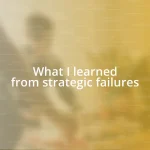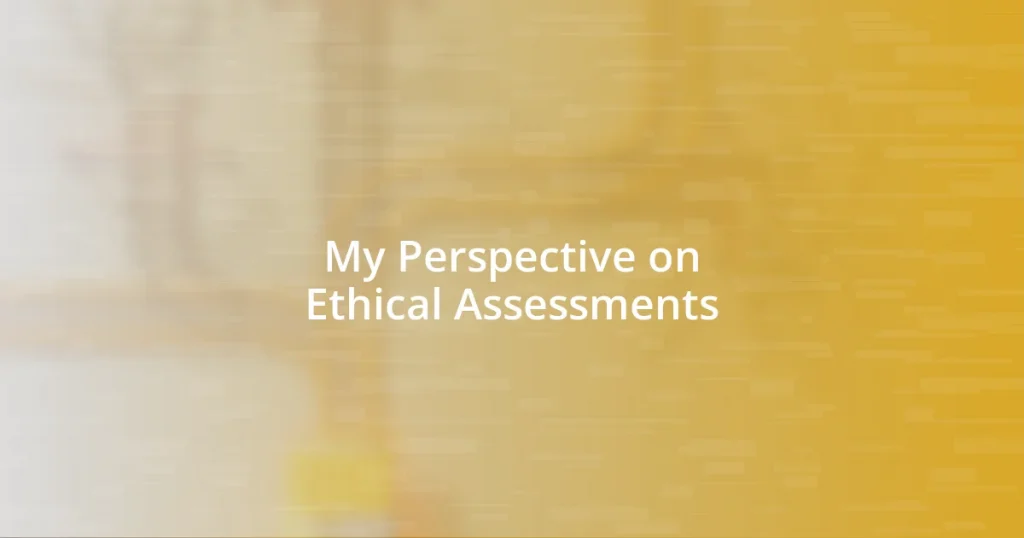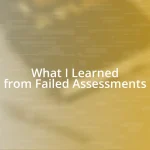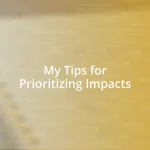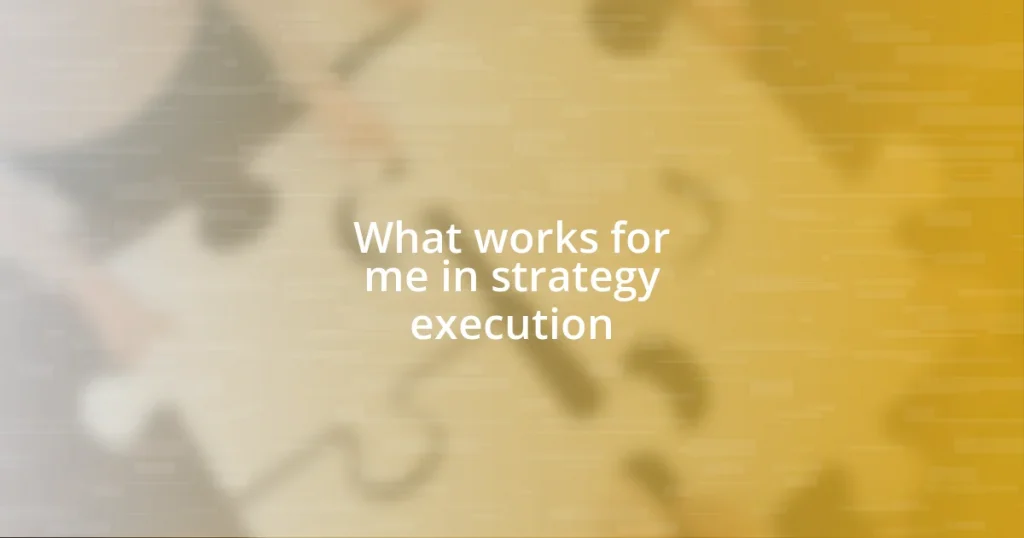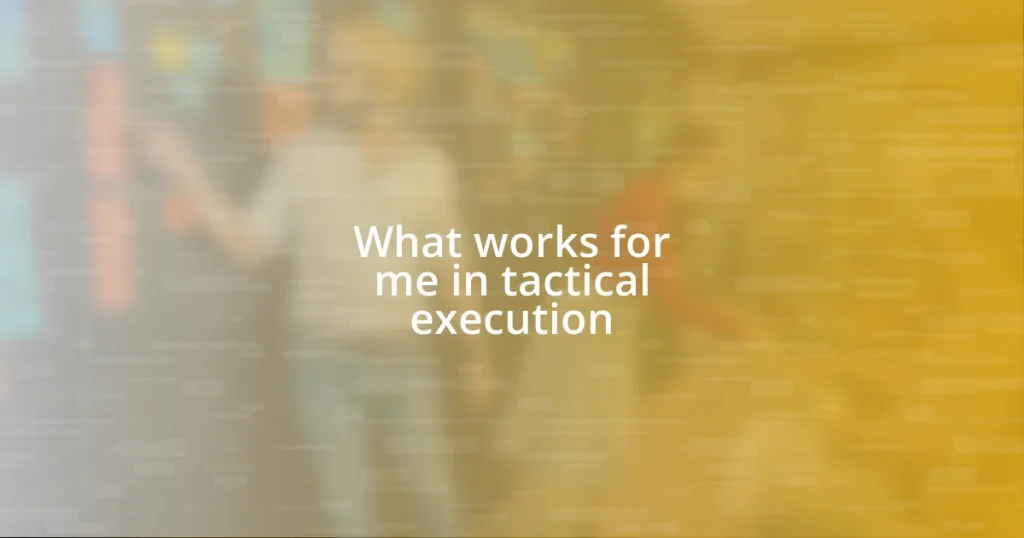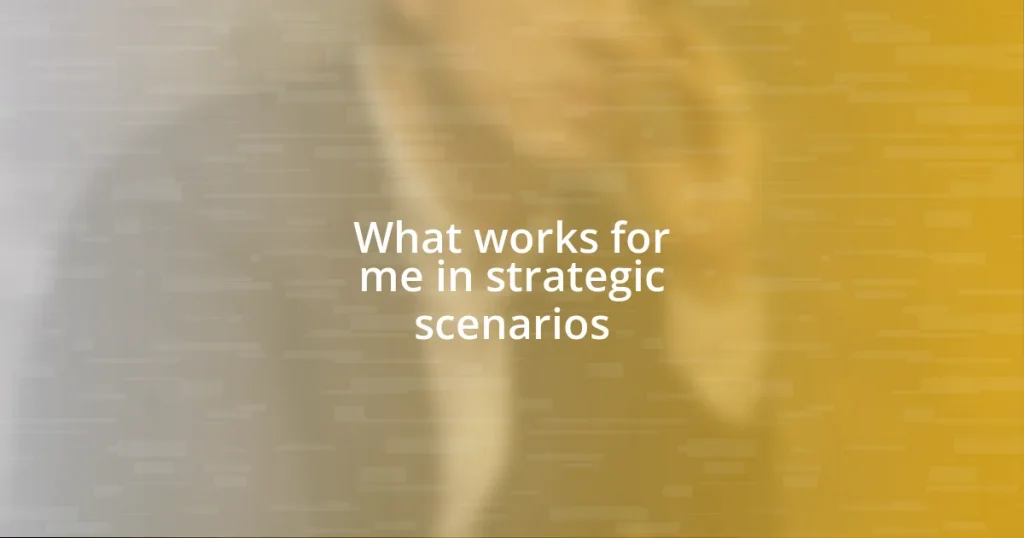Key takeaways:
- Ethical assessments are not just about adherence to moral codes; they involve deep reflection on the emotional and societal impact of decisions, highlighting the importance of context and stakeholder engagement.
- Key principles of ethical assessments include context, honesty, respect, fairness, and responsibility, which help guide decision-making and ensure accountability and empathy in actions.
- The future of ethical assessments may integrate technology for data-driven insights, emphasize stakeholder involvement, and push for standardized frameworks across industries to enhance ethical practices and decision-making.

Understanding ethical assessments
Understanding ethical assessments requires more than just a superficial glance at moral principles; it calls for a deep dive into the complexities of human behavior and societal expectations. I remember grappling with these nuances during a community project where we had to evaluate the ethical implications of our actions on local residents. This experience really highlighted the importance of understanding the context and impact of decisions—we weren’t just working on a project; we were potentially affecting lives.
When I think about ethical assessments, I can’t help but wonder: what criteria really guide our judgments? For me, it’s not just about aligning with a code of ethics. It’s about the emotional weight behind our choices and how they resonate with our values. For example, while evaluating a recent business proposal, I felt torn between profit and responsibility. That internal struggle made me realize that ethical assessments often involve balancing conflicting interests, which is anything but straightforward.
Moreover, the process isn’t merely theoretical. It’s a living, breathing dialogue between self and society, constantly evolving. I once debated ethics in my workplace, and the differing opinions opened my eyes to how personal backgrounds shape our ethical views. Engaging in these conversations not only enriches my understanding but also reveals the emotional layers involved in making ethical decisions, underscoring that nothing is ever cut-and-dried in the realm of ethics.

Importance of ethical assessments
Ethical assessments play a crucial role in guiding decision-making processes in various settings. From my experience, they help ensure that the choices made are in alignment with moral values and societal expectations. During a project at my previous job, we faced a dilemma over sourcing materials ethically. It was a long, reflective process that made me realize how essential it is to consider the broader implications of our actions.
I’ve come to see ethical assessments not as mere checklists but as opportunities for growth. In my volunteer experience with underprivileged communities, evaluating the ethics of our interventions shaped the way we approached our work. The conversations we had about the potential benefits or harm of our actions revealed how much impact these assessments can have—not just on projects but on the people involved. Such experiences remind me that ethical considerations are inherently tied to empathy, urging us to put ourselves in others’ shoes.
There’s a sense of responsibility that emerges from conducting ethical assessments. I recall a time when our team was devising a new policy, and I felt a heavy weight on my shoulders knowing it could affect many employees’ lives. This weight served as a constant reminder of the importance of transparency and fairness in our assessments, reinforcing the idea that what seems like a small decision can have significant ripple effects. Ethical assessments encourage us to weigh our choices thoughtfully, fostering a culture of accountability.
| Aspects | Importance |
|---|---|
| Guides Decision Making | Ensures alignment with values |
| Promotes Growth | Encourages reflection and empathy |
| Reinforces Responsibility | Trains thoughtful consideration of impacts |

Key principles of ethical assessments
Ethical assessments rest on several key principles that guide our comprehension and application of moral judgments. One principle I often reflect on is the importance of context; understanding the unique situation surrounding a decision is essential. I remember a time when our community group debated whether a fundraising event would truly benefit those in need or merely serve as a photo opportunity for us. This experience emphasized that ethical assessments aren’t just about being right or wrong; they require a layered understanding of our actions’ potential consequences.
- Context: Analyzing the specific circumstances, which can influence ethical implications.
- Honesty: Maintaining transparency in assessments ensures trust and integrity.
- Respect: Valuing the perspectives and rights of all stakeholders involved.
- Fairness: Striving for equitable outcomes, especially for the marginalized.
- Responsibility: Acknowledging the impact our decisions have on others, fostering accountability.
Each principle plays a pivotal role in shaping our ethical landscape, making it imperative to cultivate an awareness that honors the complexities of human experience. For me, it’s not just about ticking boxes; it’s about nurturing a deeper sense of understanding and connection with those we aim to serve.

Methods for conducting ethical assessments
One effective method for conducting ethical assessments involves stakeholder engagement, which I’ve found to be incredibly illuminating. When I led a community project, we decided to host workshops where everyone could voice their thoughts and concerns. This participatory approach not only enriched our understanding of the community’s needs but also fostered a sense of ownership and trust. How often do we overlook the voices that could provide clarity? Engaging stakeholders can bridge knowledge gaps and ensure that our assessments are well rounded.
Another method lies in the use of ethical frameworks or models. I remember utilizing the “Utilitarian Approach” during a conference on resource allocation in healthcare. By quantifying the potential benefits and harms of different proposals, we could articulate our decisions more transparently. It brought up an interesting point: are we too quick to rely on quantitative data without considering human stories behind those numbers? This framework helped keep our focus on the people affected by our decisions, a reminder that ethical assessments should never lose sight of the human element.
Lastly, reflecting on past experiences can serve as a powerful method for ethical assessments. In a project where we were considering a marketing strategy, I recalled a similar campaign that had backfired due to ethical oversights. This personal history not only informed our discussions but also added a layer of urgency to our deliberations. When faced with ethical dilemmas, I often ask myself, “What lessons can I draw from my own journey?” This reflection deepens our understanding and fosters a more thoughtful approach to ethical decision-making.

Challenges in ethical assessments
Navigating the complexities of ethical assessments can be quite daunting. One major challenge I often encounter is the subjective nature of ethics itself. What seems ethical to one person may not resonate with another. I recall a heated discussion with a former colleague about whether our organization should prioritize profit or social responsibility. This disagreement opened my eyes to how diverse moral compasses can lead to vastly different conclusions, making consensus a tricky endeavor.
Another hurdle lies in the pressure to conform to established norms or expectations. I remember when we were evaluating a program that had become a key revenue generator for our nonprofit. Despite the questionable ethics surrounding its execution, many were reluctant to challenge its success due to fear of backlash. I often wonder: how do we balance practical outcomes against ethical considerations? This tension between practicality and ethical integrity can cause significant delays or even derail important decisions.
Lastly, resource limitations can severely impede ethical assessments. In a project I worked on, we lacked adequate time and funding for comprehensive stakeholder consultations. It made me acutely aware of how crucial these conversations are, yet paradoxically, how often they are sidelined. By limiting our capacity to engage deeply with stakeholders, we risk making decisions based on partial viewpoints, ultimately undermining the ethical foundation we strive to uphold. How can we cultivate a true culture of ethics when faced with such constraints? This question continues to linger in my mind as I navigate these challenges.

Practical applications of ethical assessments
One practical application of ethical assessments that resonates with me is the integration of ethics into corporate training programs. I once participated in designing an ethics workshop for a team, and I was amazed at how open discussions about real-life dilemmas led to stronger bonds among colleagues. This approach not only equipped participants with the tools to navigate ethical decisions but also fostered a culture of openness. Did we underestimate the power of dialogue in shaping our ethical landscapes?
Another area where I’ve found ethical assessments to be invaluable is in product development. When launching a new tech product, my team and I conducted an ethical review to consider data privacy concerns. Reflecting on my previous experiences with complaints about user data exploitation, we intentionally embedded ethical considerations into our design. It got me thinking: why wouldn’t we prioritize ethics at the development stage? By acknowledging potential impacts early on, we can create more responsible and sustainable products.
Finally, I’ve seen ethical assessments play a crucial role in policy-making. During a local government initiative, we evaluated proposals through an ethical lens, engaged various community members, and prioritized the needs of the most vulnerable. It was eye-opening to witness how ethical assessments could reshape policies that truly reflect community values. Have we truly realized the extent to which ethics can influence societal progress? Emphasizing ethical considerations could lead to more equitable and just outcomes for all.

Future trends in ethical assessments
The future of ethical assessments is likely to see a significant shift towards technology integration. I recently attended a conference where AI tools were demonstrated to analyze ethical implications in decision-making processes. The potential for such innovations to provide data-driven insights is fascinating, but it also raises a question: will we trust algorithms to gauge human values? Balancing technological advancements with human-centric ethics is a challenge we need to navigate carefully.
Moreover, I’m noticing a growing emphasis on stakeholder engagement in ethical assessments. In my experience with community projects, effectively involving stakeholders has not only led to richer discussions but has also fostered a sense of ownership and accountability. Think about it—when people feel heard and valued, doesn’t that cultivate a stronger commitment to ethical practices? Engaging diverse voices early on could reshape our approach to ethical challenges.
Lastly, I envision a trend towards standardized ethical frameworks across industries. Having worked in sectors with varying ethical guidelines, I often felt the confusion that arose when collaborating with others. Wouldn’t it be beneficial if we could rely on a consistent framework that encourages open dialogue about ethics? Establishing universal standards may pave the way for clearer, more comprehensive ethical assessments, ultimately leading to a culture where ethical integrity is prioritized.









